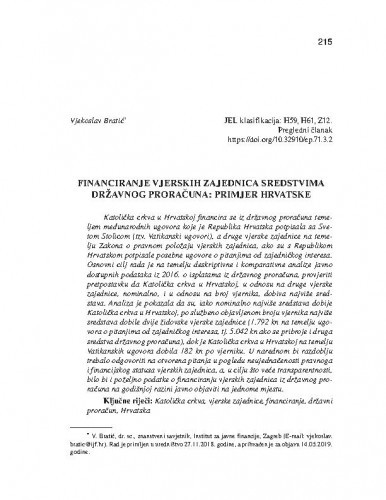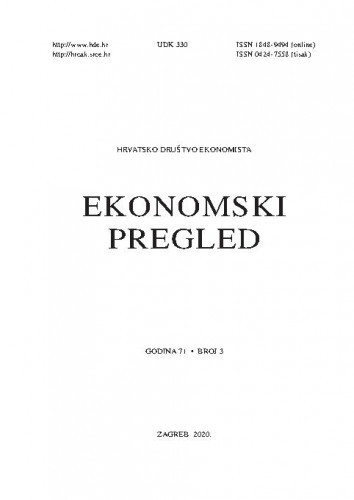Katolička crkva u Hrvatskoj financira se iz državnog proračuna temeljem međunarodnih ugovora koje je Republika Hrvatska potpisala sa Svetom Stolicom (tzv. Vatikanski ugovori), a druge vjerske zajednice na temelju Zakona o pravnom položaju vjerskih zajednica, ako su s Republikom Hrvatskom potpisale posebne ugovore o pitanjima od zajedničkog interesa. Osnovni cilj rada je na temelju deskriptivne i komparativne analize javno dostupnih podataka iz 2016. o isplatama iz državnog proračuna, provjeriti pretpostavku da Katolička crkva u Hrvatskoj, u odnosu na druge vjerske zajednice, nominalno, i u odnosu na broj vjernika, dobiva najviše sredstava. Analiza je pokazala da su, iako nominalno najviše sredstava dobije Katolička crkva u Hrvatskoj, po službeno objavljenom broju vjernika najviše sredstava dobile dvije židovske vjerske zajednice (1.792 kn na temelju ugovora o pitanjima od zajedničkog interesa, tj. 5.042 kn ako se pribroje i druga sredstva državnog proračuna), dok je Katolička crkva u Hrvatskoj na temelju Vatikanskih ugovora dobila 182 kn po vjerniku. U narednom bi razdoblju trebalo odgovoriti na otvorena pitanja u pogledu neujednačenosti pravnoga i financijskog statusa vjerskih zajednica, a, u cilju što veće transparentnosti, bilo bi i poželjno podatke o financiranju vjerskih zajednica iz državnog proračuna na godišnjoj razini javno objaviti na jednome mjestu.; Financing from the state budget of the Catholic Church in Croatia is arranged by the international treaties between the Republic of Croatia and the Holy See. Many other religious communities are also receiving funds from the state budget on the basis of the Law on the Legal Status of Religious Communities, if they signed special treaties on issues of mutual interest signed with the Republic of Croatia. In this paper we evaluate the widespread assumption that Catholic Church in Croatia receives more funds than other religious communities, both nominally and in terms of the membership. The analysis based on the descriptive and comparative analysis of publicly available data for 2016 confirmed that Catholic Church in Croatia is indeed entitled to the greatest share of available public funds. However, two Jewish religious communities jointly received most funds per member (HRK 1,792 based on the treaty or a total of HRK 5,042 per member if other funds from the state budget are added). When it comes to the Catholic Church, only the funds guaranteed by the treaties were paid from the state budget in 2016 (amounting for HRK 182 per member). In line with this, it is necessary to address the issue of unequal legal and financial treatment of religious communities in Croatia. In order to increase transparency, it would also be desirable to publish figures on funds given to all religious communities on a yearly basis.
Sažetak

 Ekonomski pregled : mjesečnik Hrvatskog društva ekonomista : 71,3(2020) / glavni i odgovorni urednik Josip Tica.
Ekonomski pregled : mjesečnik Hrvatskog društva ekonomista : 71,3(2020) / glavni i odgovorni urednik Josip Tica.